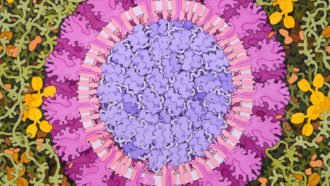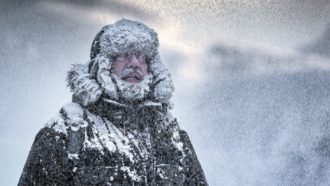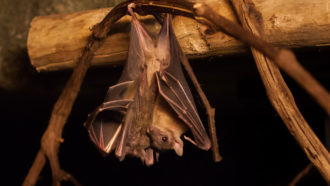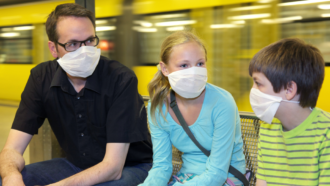Health & Medicine
-
 Health & Medicine
Health & MedicineSearch speeds up for vaccine against the new coronavirus
Scientists are investigating unusual ways to make drugs to prevent viral infections. One may even be able to treat already sick people.
-
 Health & Medicine
Health & MedicineConcussions leave clues in the blood
Athletes who suffered concussions had increased blood levels of three proteins. These proteins appear to be a chemical sign of the brain injury.
-
 Brain
BrainEasily distracted? Training your brain’s activity could help
People can train their brainwaves to direct their attention, scientists have now shown. The technique may someday be able to help people focus.
-
 Science & Society
Science & SocietyDo school-shooter drills hurt students more than they help?
There’s no set standard for shooter drills held at most U.S. schools. Experts are beginning to ask whether certain drills might hurt students more than they help.
-
 Health & Medicine
Health & MedicineFive ways to cope if shooter drills stress you out
Experts offer tips for students who might feel stressed by drills to prepare for a possible school shooter.
-
 Health & Medicine
Health & MedicineNew spray gel moves drugs deep to treat frostbite
New gel spray sends healing ingredients deep into frostbite injuries to promote healing.
-
 Animals
AnimalsThe many efforts to lick cat allergies
Up to one in five people around the world may be allergic to cats. Science is coming to help their desire for kitty cuddles.
-
 Health & Medicine
Health & MedicineImmune arms-race in bats may make their viruses deadly to people
An overactive immune system may help bats avoid being sickened by many viruses. This may viruses becoming stronger — and deadlier — when they hit other species.
-
 Health & Medicine
Health & MedicineExcess weight alters results of blood tests in kids and teens
Carrying extra weight could affect many routine blood tests in kids, new data show. Knowing this might help doctors better interpret lab results.
By Mary Bates -
 Health & Medicine
Health & MedicineScientists Say: Outbreak, Epidemic and Pandemic
These terms can describe what is happening as a disease spreads across communities, countries and the world.
-
 Health & Medicine
Health & MedicineExperts rethink need for X-ray shielding of patients
For close to 70 years, workers who perform X-ray scans of the body have been advised to shield sensitive tissues with lead 'aprons.' That may soon stop.
-
 Health & Medicine
Health & MedicineNew success in treating allergies to peanuts and other foods
Nearly 8 million U.S. children have food allergies, about two per classroom. The good news: Better ways to treat them are emerging.